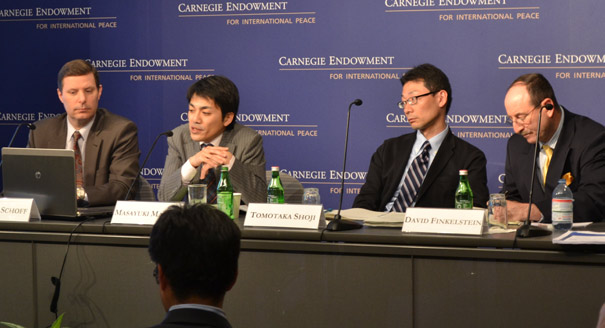Registration
Thank you!
You will receive an email confirming your registration.
Two principal authors of Japan’s National Institute for Defense Studies recent China Security Report 2012, Masayuki Masuda and Tomotaka Shoji, discussed their assessments of Chinese decisionmaking in the Communist Party leadership and policy coordination involving the People’s Liberation Army and the government. Their findings have important implications for how Tokyo, Washington, and Beijing will manage rising military tensions in the East China Sea.
Discussion Highlights
- People’s Liberation Army (PLA) as the “Party’s Army”: The PLA has remained loyal under the leadership of the Communist Party of China (CPC), Masuda and Finkelstein agreed. At the same time, the PLA has also become more professional, involved in broader mission areas, and increasingly engaged in coordination with multiple government departments, Masuda affirmed.
- Improving Policy Coordination between the Military and the Government: The role of the PLA is expanding to areas of “military operations other than war” and non-traditional security fields, Masuda stated. Finkelstein concurred, saying that the PLA’s extensive mission set has blurred the lines between domestic, foreign, and security policy. In both domestic and overseas missions, Masuda also pointed out that there has been marked progress in coordinating functions between the PLA and government departments (though shortcomings persist).
- Military-Government Collaboration in Chinese Security Policy: In terms of maritime security, the PLA demonstrates a potential leading role in coastal defense, stated Masuda. However, Finkelstein added that the PLA has enjoyed large latitude over military matters, and this may present a potential challenge to the CPC’s coordination of defense policy.
- PLA’s Desire to Institutionalize Policy Coordination: According to Masuda, the PLA has become especially proactive in defining legislation relating to the oceans, particularly since senior Party leaders began to express a clear interest in maritime issues. Nonetheless, Finkelstein argued that security interests in Beijing are outgrowing the capacity of the PLA to coordinate effectively.
